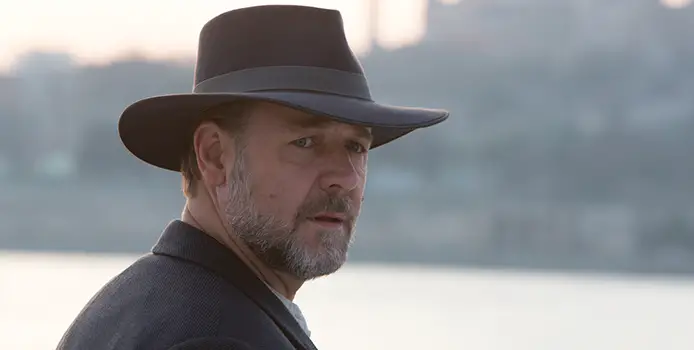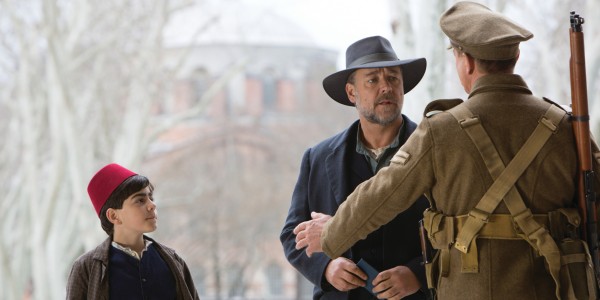THE WATER DIVINER: Russell Crowe’s Attempt At An Epic Is An Epic Fail

Alistair is a 25 year old writer based in Cambridge.…
The problem with award shows of any kind is that you’ll always find yourself comparing the nominees to each other, regardless of how different they may be. However, this is infinitely more true of awards with tied winners. The two victors may be different in every conceivable way, but the fact that we have been told they are not just equally good, but equally the best, leads our minds directly to compare the two.
Earlier this year, at the Australian Academy Awards, two films unprecedentedly tied for best picture: Jennifer Kent’s terrific horror movie The Babadook and the directorial debut of Russell Crowe, The Water Diviner. Although the genres couldn’t be any more different, the narratives deal with the same topic. It’s the reason why it is strange that the Australian Academy saw fit to honour them both – one is a horror movie about a broken-family unit with a history of grief and paternal loss, the other is a poor attempt at a sweeping epic about a broken-family unit, with a history of grief and paternal loss. Whereas The Babadook does something unique with these themes, on both a narrative and genre level, The Water Diviner plays it unremarkably safe.
The main problem is that the movie rarely stops being boring
As well as directing, Crowe stars in the lead role as Joshua Connor, the kind of wholesome family man without a bad bone in his body that only a director with a massive ego would cast himself as. Opening in 1919, four years after the Battle of Gallipoli, Connor is trying to adjust to life without his sons. We don’t know this at first, until he gets home from a day of water divining (the fact that he is a water diviner by profession is never relevant to the plot) to find his wife nagging at him to read his sons a bedtime story, only to be sat in a room of three empty beds, reading them stories that they outgrew long before they became war casualties.
This immediately sets up too many unfortunate tropes, not the least that of the nagging wife, an outdated and ever-so-slightly sexist characterisation. Soon, she dies (first his sons and now his wife – ten minutes into the movie and this guy can’t catch a break) and Joshua decides to do the thing his wife always wanted him to do: travel to Gallipoli to try and find the bones of his sons, or better yet, find out if they are still alive. From there, the over-cooked melodrama never ceases and seldom gets interesting.

The problems with The Water Diviner are easily summed up, yet hard to talk about at length in a way that seems interesting. The film is, purely and simply, just a little bit boring. This is due to a number of reasons; firstly, the emotional epic set during wartime (even if this is the First and not the Second World War being covered) is a genre that has been done to death. It needs to be radical and stand out if it has any chance of lingering in the imagination. On paper, the melodramatic concept of the narrative is memorable, it’s just the execution that is ordinary.
As a first time director, Russell Crowe hasn’t made any major missteps here, but he doesn’t show any directorial flourishes that would make this movie distinctively his or suggest he has a fruitful career behind the camera. The good moments the movie does have are divorced from the narrative altogether, when Crowe stops trying to tug for your heartstrings and actually let the characters have a laugh, showing they are fully-dimensional human beings capable of emotions other than grief and self-pity.
Highlights include Joshua having his bags stolen upon arrival in Gallipoli by the hotelier’s young son (newcomer Dylan Georgiades, the best thing in the movie by injecting it with some actual fun), leading to a chase sequence that provides the movie with a rare dose of life. I’m usually annoyed by children in movies and I imagine that if this character were in any other movie it would be no exception. Yet, the movie around him is so lifeless and boring, I was waiting for him to get back onscreen so that it would start to have more energy to it.
The more the movie tries to make you cry, the less you’ll feel like it
The Water Diviner oversells every little emotion. If you didn’t find any scene particularly tear-jerking, don’t worry, as the score will provide an uplifting string section every other minute to manipulate you into crying. What some directors don’t realise is that heightened emotions are triggered by the unknowable, the things that we didn’t expect. Jokes are a lot less funny and scares a lot less scary if we can predict what is coming, and the same goes for movies that try to make you cry.
If movies didn’t have such intrusive scores that all but beg for you to emote, I imagine they would be more successful in triggering an emotional response. As it stands, the only people I imagine crying at The Water Diviner are the people in the movie itself. Watching endless scenes of people sobbing doesn’t make me want to cry, it just makes me want to rush for the exit so that I don’t have to hear it anymore.

In the terrific documentary Not Quite Hollywood: The Wild, Untold Story of Ozploitation, various interview subjects talk about how in the “golden era” of exploitation cinema in Australia in the 1970’s, they were trying to create an alternative to the prestige cinema that was drawing acclaim by giving audiences things they actually wanted to see. The Water Diviner represents exactly the kind of prestige cinema that those filmmakers were rallying against more than four decades ago. What a shame that now the Australian Academy has finally started to acknowledge the terrific genre movies their nation produces, and yet it has to share the award with a colossal bore like this one.
VERDICT
This is a movie lacking in life or vibrancy, or any real emotions for us to actually connect to or relate to the characters; it is enamoured by its subject matter and as such tries to make itself too respectful. But by paying tribute to not just the casualties of the First World War, but all wars since (yes, this film ends with a title card saying just that), it seems to be trying too hard to make you emote and make you respect it as a piece of cinema. Russell Crowe has tried too hard to make an epic of his own – but all that he’s produced is an epic fail.
Who are your favourite actor-directors? Do you think Russell Crowe has a chance of a career behind the camera?
The Water Diviner is out now in the UK and is released on the 24th April in the US. All international release dates can be found here.
(top image source: Warner Bros. Pictures)
Does content like this matter to you?
Become a Member and support film journalism. Unlock access to all of Film Inquiry`s great articles. Join a community of like-minded readers who are passionate about cinema - get access to our private members Network, give back to independent filmmakers, and more.
Alistair is a 25 year old writer based in Cambridge. He has been writing about film since the start of 2014, and in addition to Film Inquiry, regularly contributes to Gay Essential and The Digital Fix, with additional bylines in Film Stories, the BFI and Vague Visages. Because of his work for Film Inquiry, he is a recognised member of GALECA, the Gay & Lesbian Entertainment Critics' Association.













